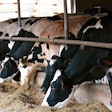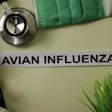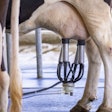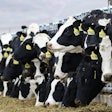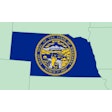
Wyoming’s first case of H5N1 avian influenza in a human has been confirmed in a Platte County older adult, according to the Wyoming Department of Health (WDH). The woman represents the third confirmed hospitalization related to H5N1 in the United States.
“While this is a significant development as bird flu activity is monitored in Wyoming and across the country, it is not something we believe requires a high level of concern among most Wyoming residents,” said Dr. Alexia Harrist, state health officer and state epidemiologist with the Wyoming Department of Health.
The test result was confirmed by a Centers for Disease Control and Prevention (CDC) laboratory.
Harrist said the woman is hospitalized in another state, has health conditions that can make people more vulnerable to illness, and was likely exposed to the virus through direct contact with an infected poultry flock at her home. H5N1 has been known to be infecting wild birds in Wyoming for some time now with the currently circulating virus spreading nationally since 2022. Infections among poultry and dairy cattle have also occurred previously in Wyoming.
According to the United States Department of Agriculture (USDA) Animal and Plant Health Inspection Service, the presence of avian influenza was confirmed in a Platte County backyard poultry flock on February 12, but information concerning how many birds were involved was not included in the report.
“Experts continue to track the spread of H5N1 through wild birds, poultry and dairy cattle across the country. A small number of people have also been infected. Most of those confirmed cases involved on-the-job close contact with poultry or cattle and mild symptoms,” Harrist said. “Unfortunately, this patient’s experience has been much more serious.”
“We want to remind people there has been no documented human-to-human virus transmission of this virus in the United States so far,” Harrist said. “Our staff has followed up with other people who had contact with the flock and the patient, and will continue working with state and national experts to monitor the situation carefully for Wyoming.”
Harrist noted the current public health risk is low, but there are some common-sense steps people may consider to help protect themselves and their families:
- Do not eat uncooked or undercooked food; cook poultry, eggs and other animal products to the proper temperature and avoid cross-contamination between raw and cooked food.
- Avoid direct contact with wild birds.
- Avoid contact with wild or domestic birds that appear ill or have died. If symptoms are observed in birds, immediately contact a veterinarian, or report sick domestic birds to the Wyoming Livestock Board at 307-777-8270. If contact with the sick or dead birds is necessary, use of personal protection clothing and items is strongly recommended.
- Avoid unprotected direct physical contact or close exposure with cattle and materials potentially infected or confirmed to be infected with bird flu.
- Do not eat or drink raw milk or products made with raw milk.
View our continuing coverage of the global avian influenza situation.






